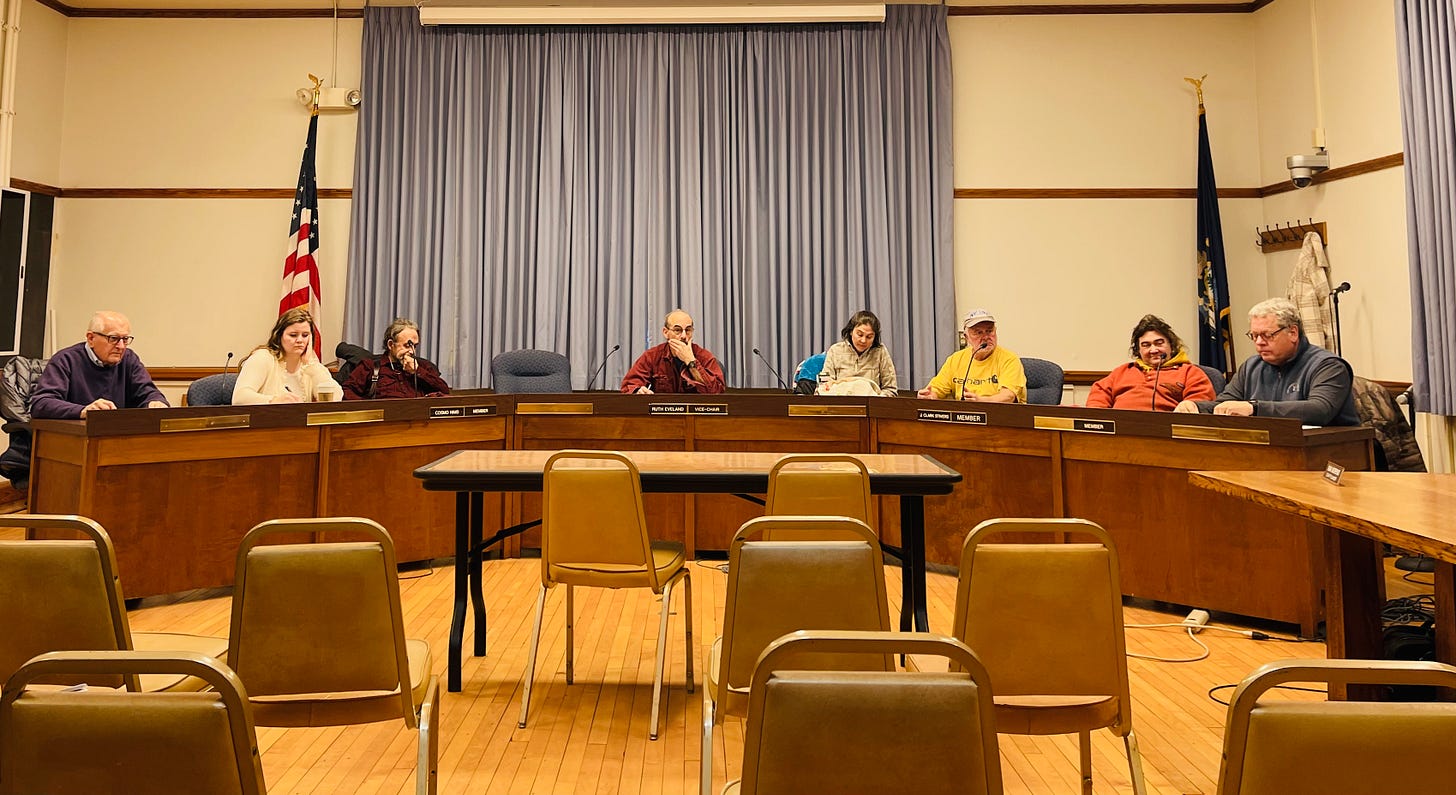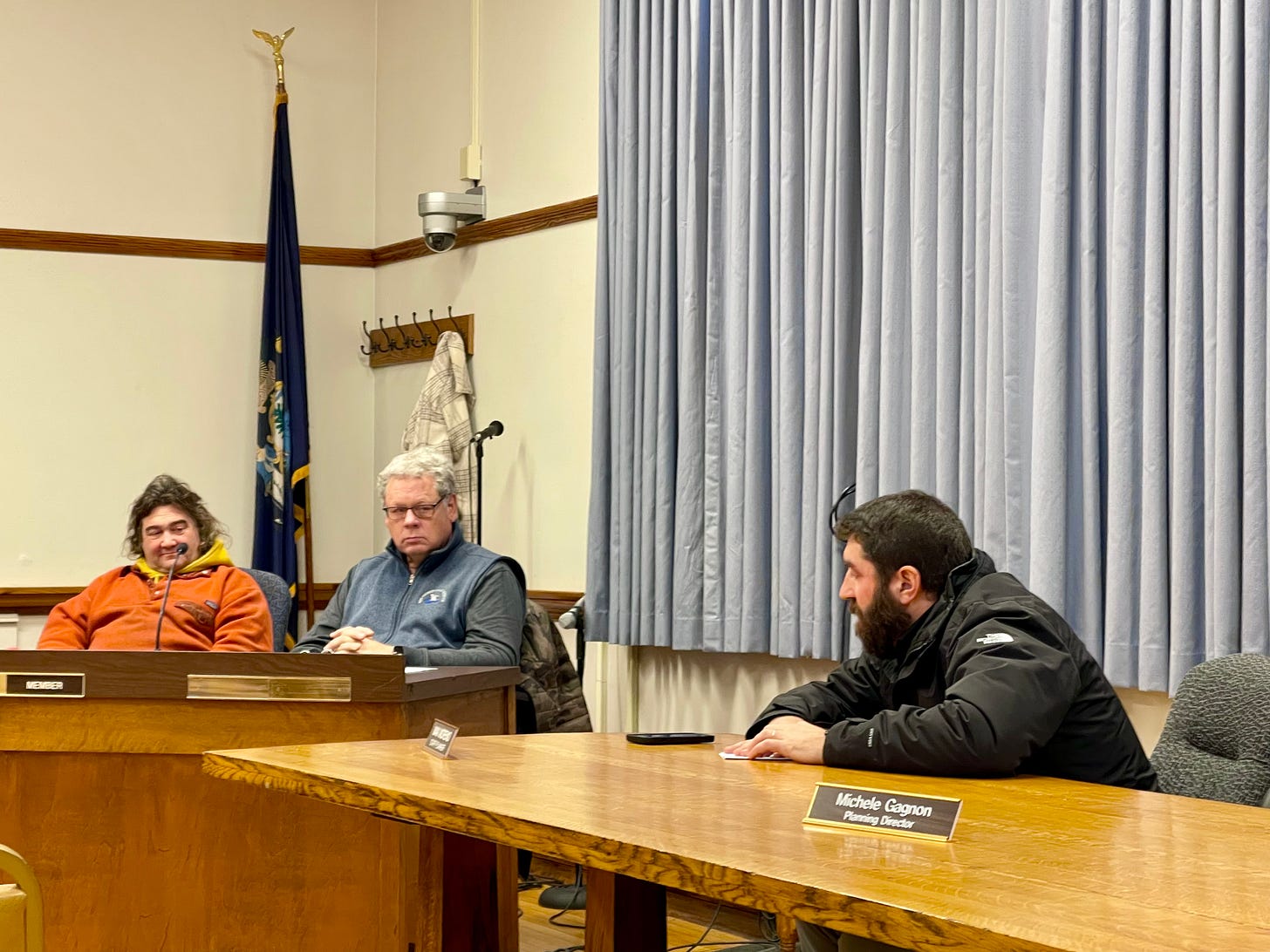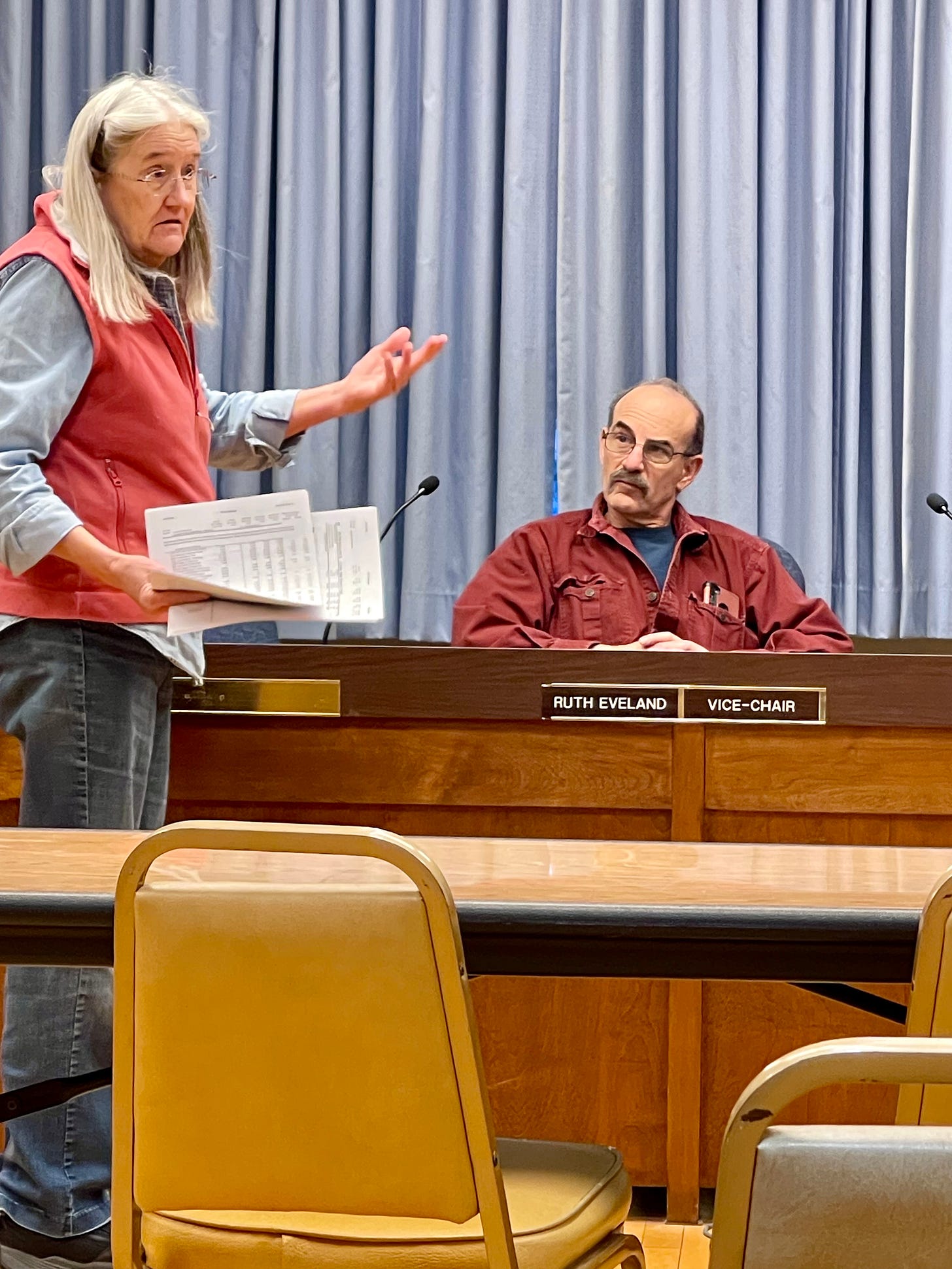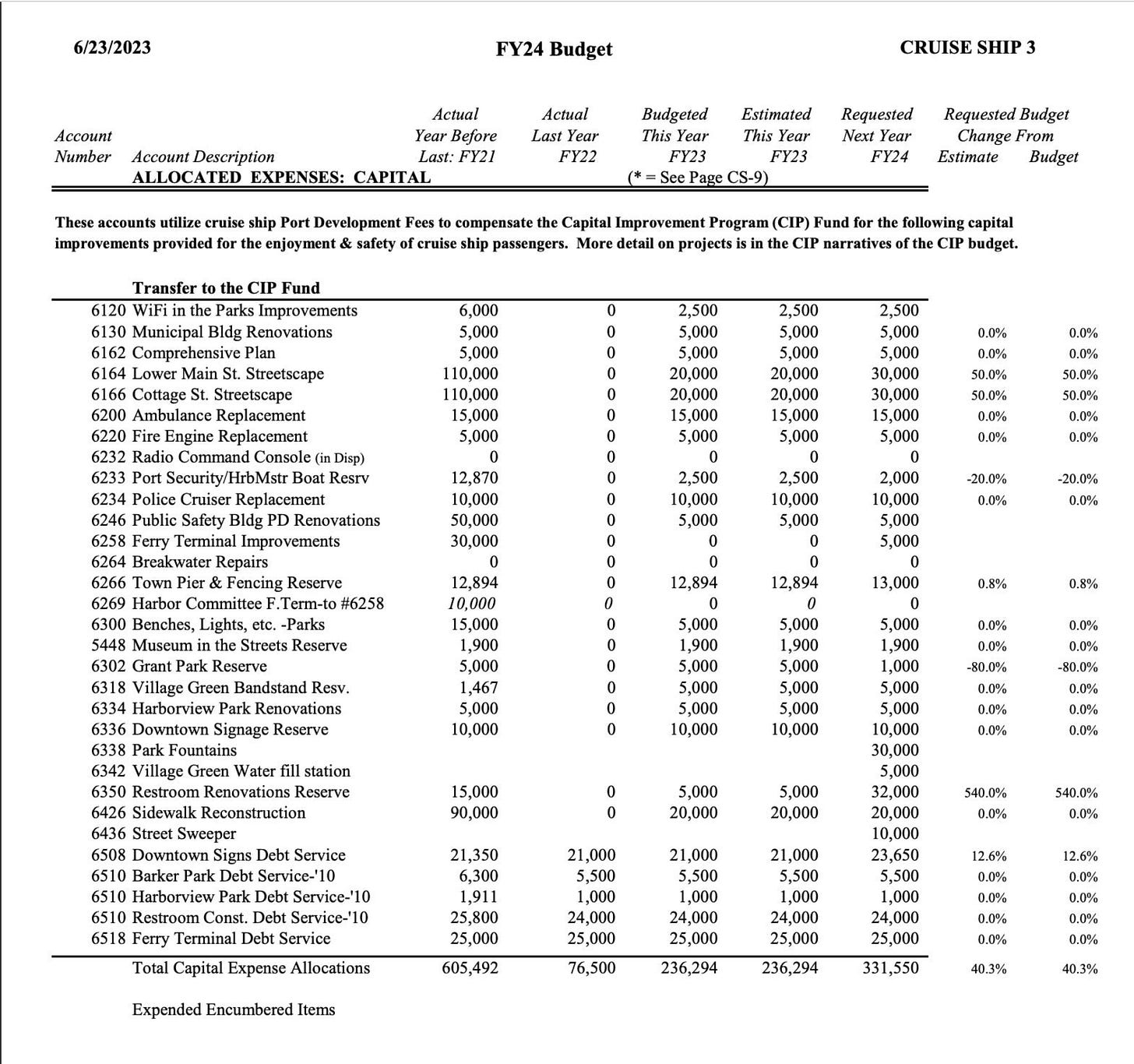What’s a Committee To Do?
Harbor Committee Delves Into Its Purpose and Its Past, Rats, Pigeons, and Cruise Ship Fee Expenditures
BAR HARBOR—Imagine that there was a breakwater that extended all across Frenchman’s Bay.
There was once a plan for that.
Imagine kayak berths in the Harbor Park located at the town’s beach outside of the Bar Harbor Inn by the Ell’s Pier.
There was once a plan for that, too.
Imagine a Harbor Committee that spends its winter months—the months that are slow for its members, many of whom work from dawn to dusk seasonally on the water—planning things, proactively making recommendations.
That’s what member Micala Delepierre told other committee members during their January 8 meeting that she wants.
Delepierre asked that the committee turn itself toward being as constructive or proactive as possible.
“It seems like we’re kind of in a holding pattern for bigger question things, so it might be a good time” to turn toward projects. The committee is currently waiting for forward action from the Town Manager James Smith, Harbormaster Chris Wharff, and the Town Council on the masterplan for a potential marina on Route 3 at the town-owned site of the Bay Ferries’ Cat terminal. It’s also waiting to hear about the federal court decision on APPLL vs Bar Harbor, which is about cruise ship disembarkation limits voted in by the town in November 2022. The changes to the town ordinance were challenged by some local businesses that work with cruise ships as well as the Maine Pilot’s Association.
Delepierre compared Bar Harbor’s Harbor Committee to Southwest Harbor’s Harbor Committee and stressed that she knew they were different beasts.
“People come to the committee for questions. The harbormaster comes to the committee before he makes big decisions,” she said of Southwest Harbor, which she said works differently.
“This is our slow time of year.”
She’d like discussion on something as simple as NARCAN education for people on the working waterfront. NARCAN is administered during a suspected opioid overdose to hopefully reverse the effects of the opioid.
“What else are we going to do instead of waiting?” she asked.

Committee Chair Kaitlyn Mullen suggested committee members come prepared for the next meeting and that they put an item on the agenda that they are going to do as a committee.
Wharff directed them toward the committee’s enabling ordinance “That should be the guiding document for what you’re looking for.”
According to its enabling ordinance, the Harbor Committee will:
A. Prepare a plan for the waterfront at 121 Eden Street that may include an international ferry terminal, recreational marina, tendering facility, commercial dock, all-tide launching ramp, transportation hub, information and education center, parking facility, and recreation area.
B. Assist the Harbor Master in the resolution of conflicts which may arise as a result from harbor rules and regulations regarding the use of the harbor and its facilities and establish an appeals process for this purpose.
C. Recommend rules and regulations, including all non-cruise-ship fees, for the use of the harbor.
D. Review the activities of the Harbor Master.
E. Review the Harbor Master's assignments of mooring locations.
F. Provide an annual report and other reports, as requested, to the Town Council and Town Manager.
Both Larry Nuesslein and Jon Carter have been on the committee for about 25 years, Nuesslein said, adding that originally it was a reactionary committee to answer Council questions about the harbor and its operations. Then, he said, they dealt with cruise ship questions. Then those questions stopped and there was a Cruise Ship Committee. That Cruise Ship Committee was disbanded this year.
Lately, the Harbor Committee has spent most of its time on the ferry terminal’s conceptual masterplan.
In the past, Nuesslein said, “we had more lobstermen on the committee.”
“You had people storm out of the committee,” Carter said, laughing.
“There was a lot more drama in the old days,” Nuesslein said.
Delepierre said that colleagues on the working waterfront laugh when she tells them she’s a member of the committee.
“Someone always wanted to change the mooring set-up and that never got done,” Carter said of the committee business a couple of decades ago. “The rat eradication…rats running around,” he held up his hands and said, “that long.”
People feeding pigeons on the harbor.
That was a big issue.
The dumpster at the end of Ell’s pier.
“That was a big deal,” Carter said. “We had people living in that.” He sighed and looked up “We got plans to do all kinds of things down there.”
In other business, Secretary Jaime Weir asked to hold off on the approval of the minutes until the next minutes so that the full testimony of David Witham can be included about the marina plan.
Wharff gave a quick update about the new floats for the skiff boats, which are expected to be completed this summer. There will be five shorter floats rather than four so that one solid timber can be used for each float, but it will be the same dimensions. The funding for the replacements comes from a grant from Maine DOT and the town’s capital improvement line item in its budget. Each year, funds are put into the budget so that when an item needs to be replaced, the money is already there. According to all involved, it was time for the replacement.
“They are past the end of their useful life,” Wharff said.
“When they were put in, they were past the end of their useful life,” Carter said.
Delepierre also asked about the harbor management plan and if it’s being worked on and if the committee could discuss it. Wharff said he hoped for that to happen this spring.
“We still have this cruise ship stuff hanging,” Wharff said. Then there’s also the potential town marina.
Wharff said that Smith and himself will figure out the next steps for marina plans, identifying grant money, and seeing how it will move forward.
Carol Chappell, a Warrant Committee member who attended as a member of the audience, had handouts about the cruise ship fees that the town takes in and expends. She asked who determines where the cruise ship funds are expended now that the town no longer has a Cruise Ship Committee to make those recommendations.
Town Council Chair Valerie Peacock, who was in the audience, said that the committee could discuss that, but should notice it first. The committee unanimously agreed to put it on its next meeting’s agenda in February, which will be in the midst of the town’s budget process. Peacock said that recommendations can still go through then.
“Those funds will have to be distributed by someone,” Chappell said and ran through how the money was broken down last year.
“What can this committee and/or Chris do to encourage some of these cruise ship funds that go to things like lower Main Street streetscape” instead be used on the potential marina site. According to case law, cruise ship funds have to be used in ways that directly benefit cruise ship passengers.
“Because we have in our plan that there could be tendering at the ferry terminal. We have in our plan that there could be berthing for the small little cruiselines,” Chappell said of the proposed marina plans, reasoning that the funds could be used there.
“Maybe,” she said to committee members, “this would be a good time for you all to ask for some of this money to go to the ferry terminal.”
“It’s his budget ultimately,” Wharff said, referencing the town’s manager, but added, “It’s important for the Harbor Committee to weigh in on that.”
There is currently a capital improvement line in the budget for the potential marina and ferry terminal site. Money from parking also funds that line.
Carter said, “My pet peeve has been that it (cruise ship fees) goes to everything but the harbor and I consider the ferry terminal to be part of the harbor.”
Committee member Bob Garland said that how cruise ship funds are utilized is not unique to Bar Harbor and he was wondering if the town had information of how other places “can stretch the boundaries of what cruise ship money can be used for.”
Member Pancho Cole said municipalities have been sued for how the funds have been dispersed and stressed, “You have to show how the money is used to directly benefit cruise ship passengers.”
“Even if there’s a very thin thread, it’s a thread.” Cole said of that connection.
“It’s a tense time right now,” Peacock said, referencing the litigation, and she added that the decisions of how those cruise ship fees must benefit cruise ship passengers come from case law, not state law. Through the Cruise Ship Committee, they had a process about this, she said.
“I would hate to have this whole discussion without noticing it,” Wharff said.
Garland asked who the town interacts with when determining how the fees are spent.
Wharff said there is no budget interaction with cruise lines, but that he believes that the interaction began when the fees first began. “There’s not like a yearly check in with the fees for CLIA (Cruise Lines International Association) to say we agree with that.”
The expenditures of those fees aren’t cleared by cruise lines or the industry, but it is up to the town to ensure that they are within the parameters set by the Tonnage Clause by the U.S. Constitution.
“This all got started somewhere,” Carter said. “It came from somewhere long before the Cruise Ship Committee.”
Delepierre said that since the Cruise Ship Committee no longer exists, the Harbor Committee should think about it.
“I think most of that stuff rests with the Council right now,” Wharff said.
Peacock agreed. “There are some things that the Cruise Ship Committee was doing that are hanging out there.”
The committee unanimously agreed to add the item to its agenda for the next meeting. The meeting adjourned at 4:37. The only members of the public attending where Chappell, Peacock, Peacock’s child, and two reporters.
LINKS TO LEARN MORE
Steering Committee Recommendations February 11, 2019 re: 121 Eden Street
Harbor Committee Meetings:
4 p.m.
The second Monday of every month










